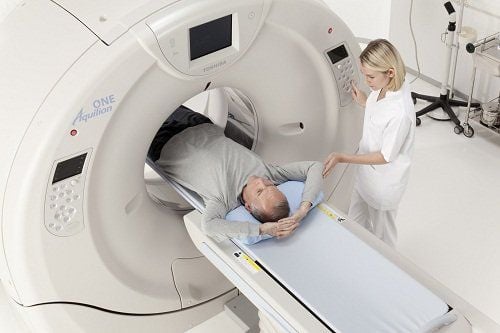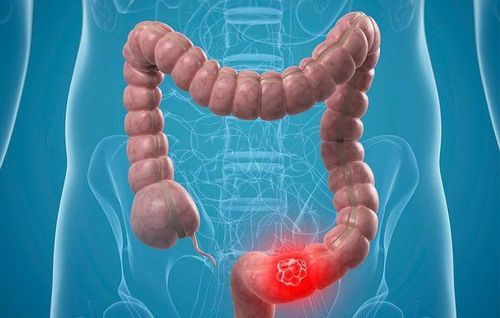This is an automatically translated article.
The article was written by Internal Oncologist - Internal Oncology Department - Vinmec Times City International HospitalIn recent years, we are seeing more and more patients with early-stage colorectal cancer due to the development of cancer screening programs. Based on the requirements for good clinical practice in these cases, the following is a summary of the European society medical oncology (ESMO) recommendations in this regard.
1. Risk factors and screening
Risk factors for developing colon cancer include lifestyle and behavioral factors (such as smoking, high intake of red meat, obesity, lack of physical activity) and genetic factors.Individuals with any of the following characteristics are considered high risk and should be actively screened:
History of adenomas, colon cancer, inflammatory bowel disease (Crohn's disease and ulcerative colitis) ; Significant family history of colorectal cancer or polyps; Genetic syndromes such as: Familial adenomatous polyposis and variants, Lynch-associated syndrome, Turcot syndrome, Peutz-Jeghers syndrome and MUTYH-associated polyposis syndrome. The goal of screening is to detect precancerous lesions and early cancers, which can be radically treated.

Ung thư đại tràng có thể do di truyền gây nên
2. Diagnosis
Endoscopy is the main procedure for diagnosis, colonoscopy is preferred. The following points should be noted as part of the standard pathological findings: morphological description of the specimen, type of surgery performed, tumor size and location, with/without large tumor barrel. body type, histologic grade and grade, extent of tumor extension into the bowel wall and adjacent organs (stage T), distance from tumor to resection (proximal, distal, and lateral), with/without tumor dissemination , lymphatic and/or neurovascular invasion, presence of tumor buds, location and number of regional lymph nodes removed and likelihood of these nodes being infiltrated by cancer cells (stage N), invasion of organs other organs (such as liver) if resected or biopsied (M stage).3. Stages
Once colon cancer is diagnosed, clinical evaluation, blood tests, and other means of screening should be performed to detect or rule out metastatic cancer. Ultrasound of the liver and abdomen may be helpful, but CT-scan is often preferable to identify distant metastases to the liver or tumor-related complications. MRI may be useful for locally advanced tumors and may be the first-line option in evaluating liver metastases in previously untreated patients.Preoperative CEA assessment is helpful for postoperative follow-up of colorectal cancer. Surgical staging includes: assessment of liver metastases, lymph node metastases, extent of tumor spread through the intestinal wall and into adjacent organs. Pathological staging should be reported according to the AJCC/UICC TNM staging system (8th edition).
In general, adjuvant chemotherapy is recommended for high-risk stage III or stage II patients. Patients with stage II are considered high-risk if they have at least one of the following clinical features: lymph node sampling <12 nodes, poorly differentiated tumor, lymphatic, vascular, or neurological invasion, tumor bowel perforation or obstruction, and pT4 stage.

Chụp CT-scan giúp chẩn đoán chính xác bệnh ung thư đại tràng
4. Treatment
4.1 Malignant polyps
Complete laparoscopic polypectomy should be performed when possible:The decision to remove surgically because neoplastic polyps have an invasive carcinoma component should be made considering poor outcomes and risk factors. surgery. Histologically unfavorable results include vascular or lymphatic infiltration, grade 3 differentiation, grade 4 invasion, or positive cross-section. When there are histologically unfavorable factors in polyps in an intermediate surgical risk patient, surgical polypectomy is recommended. Endoscopic polypectomy followed by appropriate follow-up is adequate treatment for pedunculated polyps with a localized invasive carcinoma component at the tip of the polyp, and without other unfavorable factors. Invasion to the polyp body but with a negative resection and favorable histology can also be treated with laparoscopic polypectomy. Standard surgical resection is recommended for intermediate-risk patients with sessile polyps with an invasive carcinoma component.
4.2 Localized disease
The goal of surgery is to widen the cancerous bowel along with all its lymphatic drainage. Laparoscopic colectomy can be performed safely for colon cancer, particularly left colon cancer. Laparoscopy should be performed only when: by a qualified surgeon. experience, no serious intra-abdominal adhesions due to previous abdominal surgery, no locally advanced disease and/or acute intestinal perforation or obstruction. Colorectal cancer with bowel obstruction can be treated with 1-stage or 2-stage surgery.
4.3 Treatment according to disease stage
Stage 0 (Tis, N0, M0):
Local excision or polypectomy only Monolithectomy for larger lesions that cannot be removed in situ Stage I (T1-2, N0, M0) (old stage: Dukes A or MAC A and B1):
Surgical expansion and suture No adjuvant chemotherapy Stage IIA C (T3, N0, M0; T4a-b, N0, M0):
Surgery Extensive resection and suture Adjuvant chemotherapy is not routinely recommended for unselected patients. For high-risk patients with at least 1 high-risk factor, Stage III adjuvant chemotherapy (any T, N1-N2, M0) can be considered:
Extensive resection and anastomosis Treatment Standard support is dual chemotherapy with oxaliplatin and fluoropyrimidine for 6 months (FOLFOX or XELOX is preferred). For very low-risk patients (such as N1), 3 months of treatment may be appropriate

Phẫu thuật sẽ được chỉ định ở bệnh nhân ung thư đại tràng giai đoạn 2 và 3
4.4. Personalized Medicine
In this pathology, more research is needed to identify molecular markers that will lead to advances in personalized medicine.
5. Long-term monitoring and treatment
Close follow-up is associated with improved overall survival (OS) and should therefore be considered the standard approach for patients with colon cancer.
Recommended follow-up is as follows:
History, examination and assessment of CEA levels every 3-6 months during the first 3 years and every 6-12 months during the 4th and 5th years postoperatively. Colonoscopy at first year and every 3-5 years thereafter CT-scan of chest and abdomen every 6-12 months for first 3 years in patients at high risk of recurrence (Contrast-enhanced ultrasonography (CEUS) ) may be used as an alternative to abdominal CT). Other tests and imaging should be limited to patients with suspected symptoms. As colorectal cancer survivors are the third largest group of long-term cancer survivors in Western countries, survival planning is gaining more and more attention. Key elements in the survival program are:
Prevention of recurrence and new cancer (classical outcome of follow-up) Intervention of cancer sequelae and cancer treatment (rehabilitation) ) Evaluation of late medical or psychological effects (modern outcomes of follow-up) Health promotion (lifestyle promotion, prevention of co-morbidities, etc.) Everyone needs to be actively screened and health check for timely detection of disease will increase the chance of successful treatment and reduce the risk of death from cancer.
At Vinmec International General Hospital, with a team of leading doctors and nurses with extensive experience in the field of colorectal cancer diagnosis and treatment, with the support of a system of modern technological equipment, full range of methods specialized facilities to diagnose disease and stage it before treatment such as: Endoscopy, CT scan, PET-CT scan, MRI, Mammogram, histopathological diagnosis, genetic - cytological testing, ... help detect colon cancer early even when there are no symptoms.
Please dial HOTLINE for more information or register for an appointment HERE. Download MyVinmec app to make appointments faster and to manage your bookings easily.













